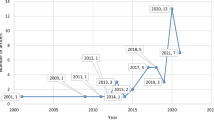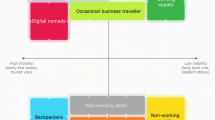Abstract
In the late twentieth and early twenty-first century, members of the librarian professional organization, REFORMA found themselves organizing at the juncture of the struggle for Latina/o rights and the digital age, anticipating a rapidly changing future with new technologies. This article looks at REFORMA’s history of activism around Information Communication Technology during the onset of the digital age. By detailing the actions that REFORMA members took during this time period, I maintain that Latina/o librarians’ advocacy and activism for Latina/o rights were critical to the librarianship profession in the digital age.
Similar content being viewed by others
Notes
REFORMA’s principal goals include developing Spanish-language and Latina/o-oriented library collections, the recruitment of bilingual, multicultural library personnel, the promotion of public awareness of libraries and librarianship among Latinas/os, advocacy on behalf of the information needs of the Latina/o community, and acting as a liaison to other professional organizations (About REFORMA, 2012).
REFORMA chapters function autonomously, working through their local library systems, state library associations and local organizations to achieve objectives (About REFORMA, 2012).
The English-only movement is a political movement attempting to instate, through policy and law, the English language as the only permitted language in public institution throughout the United States (Barker et al, 2006).
References
About REFORMA. 2012. REFORMA.org, http://reforma.org/content.asp?pl=2&contentid=2, accessed 12 December 2012.
ACLU. 2000. The Rights of Immigrants. ACLU Website, http://www.aclu.org/immigrants-rights/rights-immigrants-aclu-position-paper, accessed 2 December 2012.
Balderrama, S.R. 1997. Letter From the President. REFORMA Newsletter 16(3): 3.
Balderrama, S.R. 1998. Letter from the President. REFORMA Newsletter 17(3): 3.
Barker, V., H. Giles, K. Noels, J. Duck, M.L. Hecht and R. Clément . 2006. The English-Only Movement: A Communication Analysis of Changing Perceptions of Language Vitality. Journal of Communication 51 (1): 3–37.
Bossaller, J., D. Adkins and K.M. Thompson 2010. Critical Theory, Libraries and Culture. Progressive Librarian 34–35 (fall/winter): 25.
Case, D.O. and J.V. Richardson . 1990. Predictors of Student Performance with Emphasis on Gender and Ethnic Determinants. Journal of Education for Library and Information Science 30 (3): 163–182.
Castells, M. 1997. An Introduction to the Information Age. City 2 (7): 6–16.
Castillo-Speed, L. 1999. Building REFORMA’s Information Technology Agenda: A Report and an Invitation. REFORMA Newsletter 18(3): 4.
Castillo-Speed, L. 2001. Bridging the Leadership Divide. REFORMA Newsletter 20(1): 15.
Chabrán, R. and R. Salinas . 2004. Place Matters: Journeys through Global and Local Spaces. In Technological Visions: The Hopes and Fears that Shape New Technologies, ed. M. Sturkey, D. Thomas and S.J. Ball-Rokeach. Philadelphia, PA: Temple University Press.
Chabrán, R., O.E. Cruz, L. Fowells and A. Hammond . 2008. Wired for Wireless? Towards Digital Inclusion and Next Generation Government-Led Wireless Networks. Wireless Comparative Analysis and Best Practices Education Project, http://communitypartners.org/sites/default/files/documents/resources/wiredforwireless/Wired%20for%20Wireless%20Report.pdf, accessed 15 August 2014.
Chu, C.M. 2000. Multicultural Information Services: Collective Action. EMIE Bulletin 17 (3): 1 14.
Echavarria, T. and A.B. Wertheimer . 1997. Surveying the Role of Ethnic-American Library Associations. Library Trends 46 (2): 373–391.
Erazo, E. 1995. Information Highway Update. REFORMA Newsletter 13(4): 16.
Erazo, E. 1997. Strategic Planning Workshop Report: ALA Midwinter. REFORMA Newsletter 16(1): 11.
Executive Board Meeting Minutes. 1990. Executive Board Meeting Minutes. REFORMA Newsletter 7(3): 8.
Fouché, R. 2011. From Black Inventors to One Laptop per Child: Exporting a Racial Politics of Technology. In Race after the Internet, ed. L. Nakamura and P. Chow-White. New York, NY: Routledge.
Gaither, C. and D.C. Chmielewski 2006. Fears of Dot-Com Crash, Version 2.0. L.A. Times, http://articles.latimes.com/2006/jul/16/business/fi-overheat16, accessed 25 August 2014.
Garcia, F. 1997. Latino Website Pathfinder. REFORMA Newsletter 16(1): 12.
Garza de Cortez, O. 2000. Letter from the President. REFORMA Newsletter 19(3).
Gilton, D. 1997. Research Report. REFORMA Newsletter 16(3): 16.
Güereña, S. and E. Erazo . 2000. Latinos and Librarianship. Library Trends 49 (1): 144.
Jenkins, H. 2004. The Cultural Logic of Media Convergence. International Journal of Cultural Studies 7 (1): 33–43.
Larson, A. and A. Wilhelm . 1994. Latinos and the Information Superhighway. REFORMA Newsletter 13(3): 1, 4–6.
Library Journal Survey. 2014. How Diverse Is Librarianship? Check Out the Stats. Library Journal, 4 (May), http://www.slj.com/2014/05/diversity/how-diverse-is-librarianship-check-out-the-stats/#_, accessed 18 May 2014.
Martinez, E. 2010. Chicano Librarianship. American Libraries Magazine, http://americanlibrariesmagazine.org/2010/11/02/chicano-librarianship/, accessed 10 May 2013.
Nakamura, L. 1995. Race in/for Cyberspace: Identity Tourism and Racial Passing on the Internet. Works and Days 25/26 (13): 181–193.
Noble, S.U. 2013. Google Search: Hyper-Visibility as a Means of Rendering Black Women and Girls Invisible. InVisible Culture 19 (Fall) http://ivc.lib.rochester.edu/google-search-hyper-visibility-as-a-means-of-rendering-black-women-and-girls-invisible/.
Ocon, B. 2002. Message from the President. REFORMA Newsletter 21(3): 3.
Ortego, G. 1995. Censorship in America: Bless Me, Ultima Banned. REFORMA Newsletter 13(4): 1.
REFORMA. 1987a. Liber’87: REFORMA in Spain. 1987. REFORMA Newsletter 6(3): 9.
REFORMA. 1987b. Long Range Planning in San Francisco. REFORMA Newsletter 6(3): 9.
REFORMA. 1988a. English Only Movement. REFORMA Newsletter 7(1): 14, 19.
REFORMA. 1988b. REFORMA Newsletter 7(4): 1.
REFORMA. 1988c. Toltran System Multi-Lingual Software. REFORMA Newsletter 7(4): 2.
REFORMA. 1989a. ALA Announces New Minority Policy. REFORMA Newsletter 8(1): 14.
REFORMA. 1989b. Correctional Library Services for California’s Young Hispanics. REFORMA Newsletter 8(1): 17–18.
REFORMA. 1989c. National Library Week. REFORMA Newsletter 8(2): 12.
REFORMA. 1990a. ALA Committee on Accreditation. REFORMA Newsletter 9(1): 18.
REFORMA. 1990b. Beyond U.S. Boundaries. REFORMA Newsletter 9(3): 12.
REFORMA. 1990c. First Latin American Conference on New Information Technology. REFORMA Newsletter 9(1): 23.
REFORMA. 1990d. News from the ALA. REFORMA Newsletter 9(3): 12.
REFORMA. 1990e. REFORMA at ALA Conference in Dallas. REFORMA Newsletter 9(3): 11.
REFORMA. 1994a. Recommendations for Curriculum Changes. REFORMA Newsletter 13(1): 3.
REFORMA. 1994b. REFORMA Announces First National Conference on Latino Library Services. REFORMA Newsletter 13(3).
REFORMA. 1994c. Unofficial Minutes of the REFORMA Executive Board Meeting. REFORMA Newsletter 13(4): 10.
REFORMA. 1994d. Zapatistas in Cyberspace. REFORMA Newsletter 13(2): 22.
REFORMA. 1995. REFORMANET. REFORMA Newsletter 13(4): 16.
REFORMA. 1996a. PAIS. REFORMA Newsletter 15(3–4): 15.
REFORMA. 1996b. REFORMNET. REFORMA Newsletter 15(1): 10.
REFORMA. 1996c. Unofficial Minutes. REFORMA Newsletter 15(1): 10.
REFORMA. 1997a. Hispanic Library Education Institute. REFORMA Newsletter 16(1): 8.
REFORMA. 1997b. Information Technology Committee of National REFORMA. REFORMA Newsletter 16(1): 6.
REFORMA. 1997c. Internet Resources: LaRed Latina Website & Listserv. REFORMA Newsletter 16(1): 11.
REFORMA. 1997d. REFORMANET. REFORMA Newsletter 16(1): 3.
REFORMA. 1997e. Website Update. REFORMA Newsletter 16(1): 5.
REFORMA. 1998a. Ethnic Internet Resources. REFORMA Newsletter 17(3): 10.
REFORMA. 1998b. Results of the Information Technology Survey. REFORMA Newsletter 17(3): 1, 9.
REFORMA. 1999a. ALA Annual Meeting Minutes. REFORMA Newsletter 18(3): 14.
REFORMA. 1999b. Information Technology Column. REFORMA Newsletter 18(3): 4–5.
REFORMA. 2000. Second National Conference. REFORMA Newsletter 19(3): 1.
REFORMA. 2002a. REFORMA Addresses Language Rights. REFORMA Newsletter 21(4): 1.
REFORMA. 2002b. REFORMA Adds Its Voice to ALA’s “Principles of the Networked World.” REFORMA Newsletter 21(2): 7.
Salinas, R. 2000. CLNet: Redefining Latino Library Services in the Digital Era. In Library Services to Latinos: An Anthology, ed. S. Güereña. Jefferson, NC: McFarland & Company.
Schement, J. 2001. A Telecommunications Policy Agenda for Latinas en la Edad de Información. Aztlán 25 (2): 209–221.
Tarin, P. 1995. Equity on the Information Superhighway. REFORMA Newsletter 14(1/2): 1.
Tse, L. 1989. Library Service to Cultural Minorities. REFORMA Newsletter 8(4): 7.
Acknowledgements
The author is sincerely grateful to K.R. Roberto and Linda Smith for their review and comments on this article. The author would also like to thank the anonymous reviewers, Lourdes Torres and María Isabel Ochoa-Alvarez for their helpful feedback. Finally, the author would like to thank Jessica Barron and Tracy Drake for their support and encouragement of this article’s publication.
Author information
Authors and Affiliations
Rights and permissions
About this article
Cite this article
Villa-Nicholas, M. Latina/o librarian technological engagements: REFORMA in the digital age. Lat Stud 13, 542–560 (2015). https://doi.org/10.1057/lst.2015.43
Published:
Issue Date:
DOI: https://doi.org/10.1057/lst.2015.43




